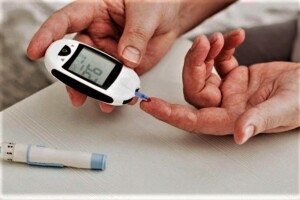Written by Fazil Hussein: A new DNA diabetes marker augments the 10-year risk prediction of type 2 diabetes, according to news from Nature Aging.
Diabetes mellitus is one of the most prevalent diseases in the world and a leading cause of mortality. Around half a billion people live with diabetes worldwide, with type 2 diabetes (T2D) making up about 90% of these cases. Individuals with diabetes can suffer from debilitating complications including nerve damage, kidney disease and blindness. The disease also increases the future risk of dementia and cardiovascular disease. The risk of complications is exacerbated if blood glucose levels are poorly managed.

Many of the downstream complications of T2D are preventable with early intervention and good management of blood glucose levels. In many instances, lifestyle changes can effectively prevent the onset of T2D. Accurate risk prediction is therefore important.
What is the new DNA diabetes marker?
Traditional diabetes risk assessment relies on information such as age, sex, family history and body mass index. DNA methylation pattern is characterized by dynamic chemical modifications to DNA that, broadly speaking, help to turn genes on and off. DNA methylation patterns are influenced by genes and the environment, which makes them excellent candidates for disease-risk prediction and a useful DNA diabetes marker.
How did the researchers manage the DNA diabetes marker?
The researchers aimed to augment the traditional diabetes risk prediction via the inclusion of DNA methylation data. They examined 200,000 positions across our genome where these DNA methylation marks can be found. They developed a probabilistic model to predict which individuals are at a high risk of developing T2D within a 10-year timeframe. Their model was derived using data collected for Scottish individuals (the Generation Scotland cohort) and externally validated in a German cohort, KORA. Linkage to hospital and primary care records enabled them to identify who developed T2D, and when.
What did the researchers find out?
The researchers observed improvements to 10-year risk prediction over and above traditional risk factors. The figure below shows receiver operating characteristic (ROC) curves for a model with traditional risk factors versus models that also contained a DNA methylation.
The traditional risk factor model (green) gave an area under the curve (AUC) of 0.839, compared to 0.872 for the best model with DNA methylation. Notice that perfect prediction is denoted by an AUC of 1, and a value of 0.5 indicates prediction that is equivalent to guessing heads versus tails in a coin toss.
Implications of the new DNA diabetes marker
The main implication of this research is that a wealth of information can be extracted from a single blood sample to help to improve risk prediction of a common disease outcome (T2D). This approach could help to better identify people at risk for T2D and try to prevent the onset of the disease.
As with all probabilistic predictions, a trade-off exists between false-positive and false-negative calls. Health economic analyses should explore cost–benefit models for screening and intervention versus the cost of generating DNA methylation predictors.
Future research could focus on the prediction of other common disease outcomes. Other extensions include refinement to the statistical methods used to derive the predictors, as well as the inclusion of additional disease cases and controls from differing cultural and ancestral backgrounds.
Source:
Cheng, Y., Gadd, D.A., Gieger, C. et al. Development and validation of DNA methylation scores in two European cohorts augment 10-year risk prediction of type 2 diabetes. Nat Aging 3, 450–458 (2023). https://doi.org/10.1038/s43587-023-00391-4
Improved prediction of type 2 diabetes onset from blood-based biomarkers. Nat Aging 3, 378–379 (2023). https://doi.org/10.1038/s43587-023-00390-5
See also:
Cancer Blood Tests Revolutionize Oncology.
Go to the News Board
